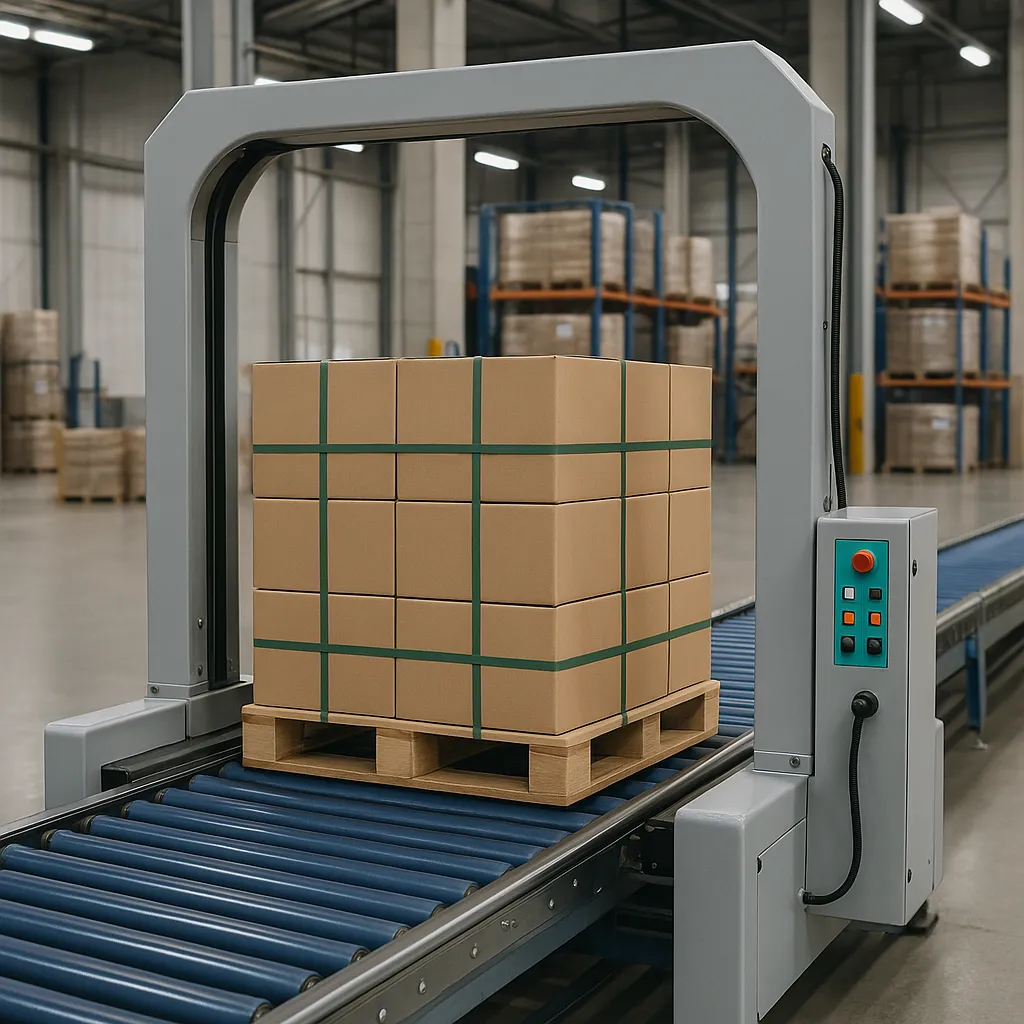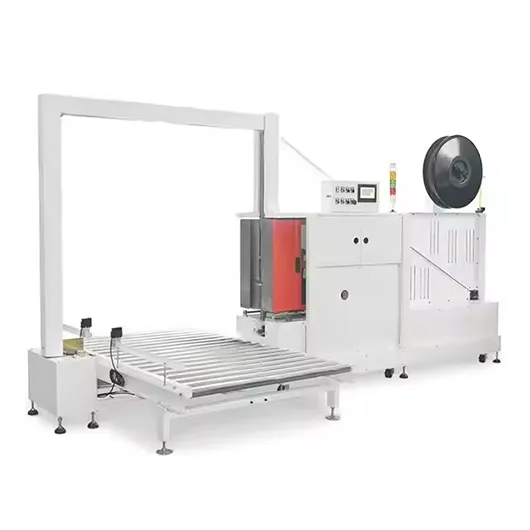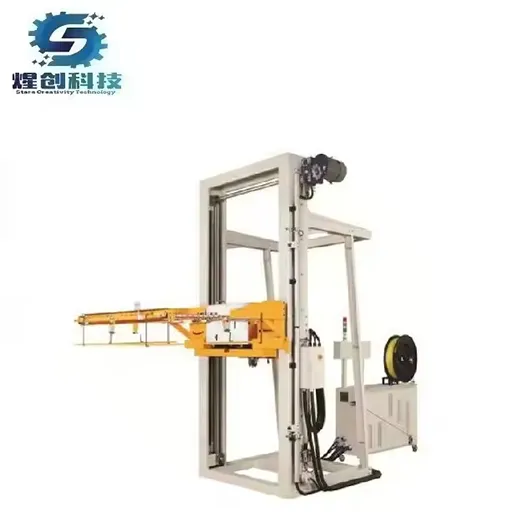Um zu vermeiden, dass Ihre Anfrage verspätet beantwortet wird, geben Sie bitte Ihre WhatsApp-/Skype-Adresse zusammen mit der Nachricht an, damit wir Sie gleich beim ersten Mal kontaktieren können.
Wir werden Ihnen innerhalb von 24 Stunden antworten. Wenn für dringenden Fall, fügen Sie bitte WhatsApp/WeChat: ,. Oder rufen Sie direkt an.
Damaged pallets, slow lines, soaring labor costs—sound familiar? These pain points agitate profit margins until a reliable fix appears. Solution? Upgrade to a purpose‑built automatic strapping machine that locks every load down tight, fast, and error‑free.
Eine automatic strapping machine uses motor‑driven tensioning, sealing, and cutting heads to wrap a Gurt around cartons, bundles, or Palette loads—then heat‑seals or friction‑welds it in seconds. This operator‑less cycle speeds up end‑of‑line packaging, boosts load stability, and cuts labor by up to 70 percent.

Before diving into specs, let’s get clear on the basics. Eine automatic strapping machine pulls a coil of polypropylene (PP) or polyester plastic strapping through an arch, senses the product edge, tensions the band, produces a secure Siegel, and ejects the loop. The entire cycle—feed, tension, heat‑weld, cut—can finish in 1.5 seconds, rivalling high‑speed wrappers for throughput.
| Core Module | Funktion | Bottom‑Line Benefit |
|---|---|---|
| Arch frame | Guides the Gurt smoothly around the load | Consistent band placement; no mis‑feeds |
| Servo‑driven rollers | Tensioning & feed | Precise force eliminates product crush |
| Fusion heater | Creates the Siegel | No metal clips → lower consumable cost |
| PLC + HMI | Stores up to 20 presets | One‑touch changeovers, fewer errors |
“Our machines are designed for uptime—quick‑release rollers and dust‑proof casings mean scheduled service drops from hours to minutes,” notes Chen, Senior Engineer at our industry‑leader plant.
Explore a step‑by‑step animation on our automatic online strapping machine.
Strapping is never one‑size‑fits‑all—your throughput and labor mix determine the sweet spot. “The right tool” depends on volume, budget, and floor space.
Process: The operator loops the Gurt by hand; the machine tensions and seals.
Best Use: Start‑ups, low‑volume applications, and pop‑up fulfillment stations.
Pros:
Process: Cartons arrive via conveyor; photo‑eyes trigger instant strapping.
Best Use: 24/7 factories, in‑line end‑of‑line cells, Palette lines.
Pros:
| Merkmal | Semi‑Automatic | Fully Automatic Arch |
|---|---|---|
| Start Signal | Foot pedal | Photo‑eye / PLC |
| Labor Need | 1 FTE | 0 |
| Avg Payback | 24 mo | 10 mo |
| Ideal load | Custom kits | High‑speed cartons |
A Brazilian e‑commerce brand replaced five tabletop units with two fully automatic arch strappers connected to a robotic sorter and saw a 45 % throughput boost.
See our Vollautomatische vertikale Palettenumreifungsmaschine for high‑bay warehouses.

Strap choice is the hidden hero of every successful shipment. Choosing the wrong Gurt is like wearing sneakers to a construction site—you’ll feel it later.
| Material | Breaking Strength | Elastic Recovery | Typical Application |
|---|---|---|---|
| PP | Up to 250 kg | 20 % | Carton closing, general‑purpose bundling |
| PET | Up to 700 kg | 12 % | Brick, lumber, pallet tying |
| Steel Strap | 1 000 kg + | 1 % | Pipe, coil, heavy‑duty steel mill loads |
Polypropylen is the most economical choice and seals cleanly on heater plates—perfect for our PP-Umreifungsband.
Utility planning saves time, cash, and headaches on install day. “Measure twice, install once” applies here.
Allow 1 m coil‑change access and 0.6 m control‑side clearance. Download CAD files from our arch compression machine page.
Modern plants crave seamless data and motion—strappers now fit right in. Short answer: yes—today’s PLCs speak every language your line uses.
A German brewery linked our automatic strapping machine to its AGV fleet, achieving fully operatorless flow.
Specs cut through marketing fog—know your numbers before you buy. Benchmark yours:
| Spec | Entry | Mid‑Range | High‑Speed |
|---|---|---|---|
| Cycles/min | 18–20 | 40–45 | 65 + |
| Tension (N) | 400–600 | 800–1 000 | 1 200 + |
| Top‑press force | - | 2 kN | 4 kN |
| Max load height | 600 mm | 1 000 mm | 2 200 mm |
Why compression matters: loose flutes in corrugated board spring back; compression strappers cut truck cube 7 %.
Every plant balances load weight, budget, and footprint differently. Let’s map the two extremes.
Battery‑driven strap banding machines travel where pallets are built—no conveyor investment, just 4 kg of handheld power.
Seeing theory in action brings the numbers alive. A multi‑client 3PL processed 19 000 mixed cartons daily. After installing two automatic arch machines, carton per‑hour rates jumped from 480 to 634 and labor dropped 50 %. Full story on our carton strapping page.
Smart maintenance keeps your strapper earning money, not sitting idle. Daily TLC takes < 15 min: blow dust off heaters, inspect rollers, and verify orange heater glow. Weekly coil checks and quarterly OEM part swaps protect the 99 % OEE target.
Management always asks, “When does it pay back?”—here’s your answer.
ROI Months = Cap‑ex / (Savings – Extra Costs). Plug real numbers: $38 000 investment ÷ $5 350 monthly gain ≈ 7.6 months.
Book a live demo of our electric strapping machine or request a free line audit today.

How is an automatic strapping machine different from a banding machine?
Banding uses wider paper or film at low tension; Umreifung applies high‑tension plastic or steel strap for shipping loads.
Can I run PP and PET on the same unit?
Yes—dual‑profile heaters and auto‑tension presets make swapping as easy as changing a coil.
What if my cartons vary in height?
Choose an arch model with floating head; it lowers to meet the tallest point, then fires the Gurt.
Do fully automatic strappers handle corner protectors?
Our corner‑applicator module aligns boards before the first Gurt in a single motion.
How often should I replace the heater blade?
Every 200 000 cycles, or sooner if welds show pinholes.
Is side‑seal worth the extra cost?
If your plant is dusty, a side seal head avoids grit and triples heater life.
Move fast—your pallets won’t wait. Let’s customize a solution that makes every shipment stronger, safer, and more profitable.